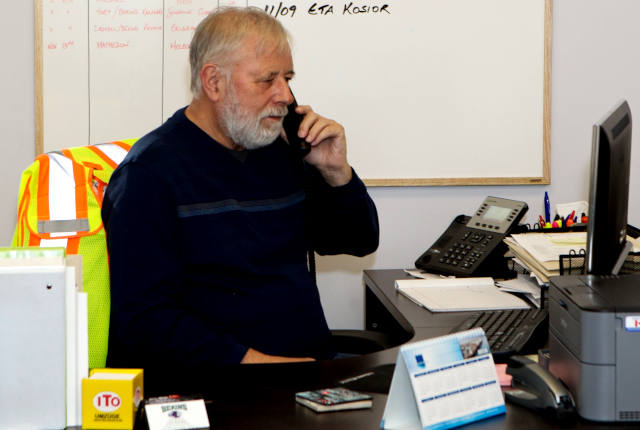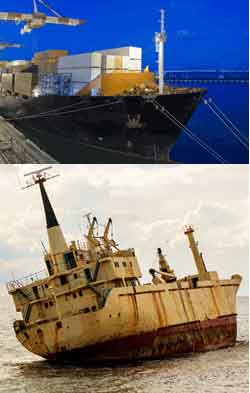
In 1997, Bekins separated its international move group into a separate company. Moves that required transfers between transport methods, documentation handling and languages have very different cost centers and needs. Cross border moves expose the unique rules and country priorities. The different people involved have their own experience and expectations. Bekins Worldwide staff use their knowledge and experience in the dynamics of international relocation daily. They know the short cuts local moves depend on are exactly what adds extra time and expense to all international moves. Only handling International, overseas and cross border moves focuses their work towards your trouble free move.

All Bekins staff are experienced, trained and background checked. Hiring the best and most experienced members of the moving and storage industry contributes to a stable, long term, honest and efficient team. Extensive staff training, in using the right materials and equipment, builds specialized abilities. Using trucks equipped with “air ride”, as opposed to spring suspension, delivers shipments that “float” on air with reduced road vibration. These are the reasons many have selected Bekins as the best choice for international moving, relocation and removals.
We are proud to deliver belongings in the same condition as when they originally entered the moving process. Our professional international packers, skilled van operators and modern equipment contribute to the high standard of quality service customers expect.
No matter how careful everyone is, and how many precautions are taken, accidental loss or damage may occur. Buying Transit Protection should be no different than homeowners insurance on the contents of your home. For peace of mind, you might not want to be without it. To meet particular needs there are levels of possession Transit Protection for accidental loss or damage, based on the countries or move situation. Your destination may allow Released Value Protection and Replacement Value protection. Options may also exist for Motorized Vehicle Protection, Storage-In-Transit Protection and Long Term Storage Protection.
International Move Management Coordinates These Jobs
• The Client and the owner of the possessions, are always top of our mind, during each step of the move process.
– also called the exporter and the importer by the border services and import tax departments of the countries involved
• The Move Manager, who may be another member of the family or corporate officer dedicated to the move
– this includes shipping company coordinators or brokers who monitor and guide the shipment through to the end point
• The Origin Agent
– the packers or agents that did the site survey, quoted prices or did the packing and pick up
• The Consolidating Warehouse
– Less than Container Loads (i.e. LCL) are a common method of shipping household goods that are brought together
– often called a Bonded Warehouse
– this provides a location and the handling to bring shipments together that fill each container and keeps costs under control
• The Freight Forwarder
– typically is government licensed, in each country, handling documentation and language considerations, within that jurisdiction
• The Origin Port
– this is the Origin Terminal or Export Port
– it is where the packed and sealed container has to clear customs to be loaded for international shipment
– Origin fees or handling charges are incurred and managed here
• The Container Company
– is the owner of the ocean going container that holds those household goods
– Shipping containers are built to stand up to many elements, fumes, dust or even pests that are unexpected consequences

• The Shipping Company
– This is the owner of the ship transporting the household goods to the next country.
– Costs vary based on fuel being consumed and time of delivery. Ultra slow propulsion, low fuel consumption techniques, overbooked cargo cause handling issues used at their convenience.
– Shipping companies can rearrange schedules, damage cargo, rearrange routes without liability for the resulting extra costs.
– The shipping company picked is the difference between arriving as expected or when fate allows.
– There are basically two classes of shipping companies. Ships that are opportunistic with picking up local shipments or doing on route drop offs that bend time schedules. Low cost available fuel at these ports are not often what these “tramp shippers” expected so add both time and money costs. Ships that travel direct timely and predictable routes are the “core shippers”. They too are impacted by unexpected events, like the Panama’s water supply slowing passage between the Atlantic and Pacific. For the most part core shippers are more dependable with shipping costs and on time arrival because they receive better port cooperation with fuel supply and dock services arriving as expected.
• Destination Port
– This is the Destination Terminal or Import Port.
– Destination fees and handling charges are incurred in the destination countries currency.
• Destination Bonded Warehouse
– Here importation fees occur as items are cleared by the destination country customs.
• The Destination Agent
– This is the delivery agent who processes the delivery from arrival at the port through to unpacking at the new residence.
– They speak the language, know that countries rules and understand local delivery issues.
– They arrange transit of 40 foot or other size containers into local moving company trucks.
Each international or cross border move finds a unique combination of people and companies fulfilling these jobs. Usually without the members of the work chain even knowing about each other. It is always a careful balance of costs versus proven performance where experienced companies are involved and serendipity where do it yourself thriftiness select the lowest cost options. Regardless, knowing the roles that must be taken is a best first step to avoid extra costs later.
